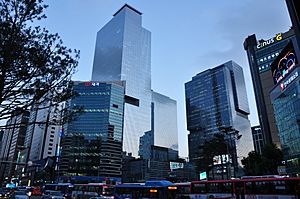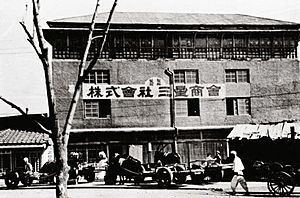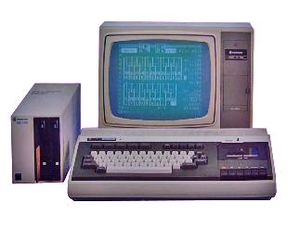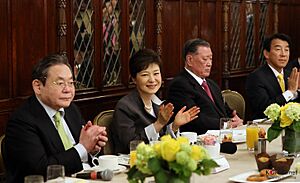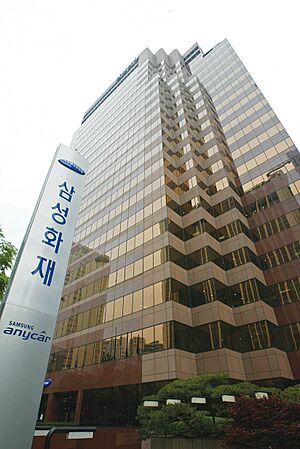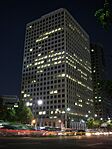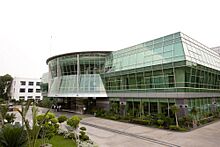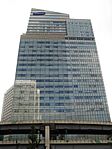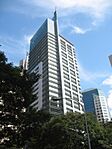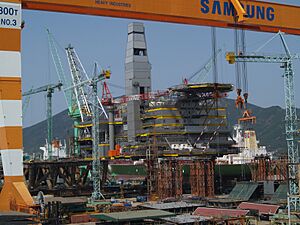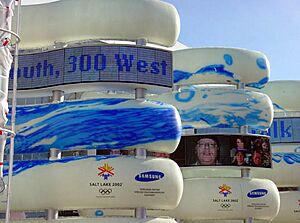Samsung facts for kids
|
||||||||||||||||||||||||||||||||||
Samsung Group (Korean: 삼성; pronounced [samsʌŋ]) is a huge South Korean company. It's a multinational group of businesses that make many different things. Its main office is in Samsung Town in Seoul, South Korea.
Samsung is the largest chaebol in South Korea. A chaebol is a big family-controlled business group. As of 2024, Samsung is one of the world's most valuable brands.
Lee Byung-chul started Samsung in 1938 as a trading company. Over the years, it grew and started doing business in many different areas. These included food, clothes, insurance, and stores. In the late 1960s, Samsung began making electronics. Later, in the 1970s, it moved into construction and shipbuilding. These new areas helped the company grow even more. After Lee Byung-chul passed away in 1987, Samsung split into five main business groups.
Some of Samsung's most important companies include Samsung Electronics. This is one of the world's largest technology companies. It makes consumer electronics and computer chips. Samsung Heavy Industries is the world's second-largest shipbuilder. Samsung Engineering and Samsung C&T Corporation are big construction companies. Other important parts of Samsung are Samsung Life Insurance, which is a large insurance company. Samsung Everland runs Everland Resort, a popular theme park. Cheil Worldwide is also one of the world's biggest advertising agencies.
Contents
What Does "Samsung" Mean?
The name Samsung comes from Korean words. According to the company's founder, it means three stars. The word three means something big, many, and powerful. The word stars means everlasting or eternal.
Samsung's Journey Through Time
Early Years (1938–1970)
In 1938, Lee Byung-chul started a trading company called Samsung Sanghoe. It was in Daegu, South Korea. Samsung began as a small company with 40 employees. They sold dried fish, local groceries, and noodles. The company did well, and Lee moved its main office to Seoul in 1947.
During the Korean War, Lee had to leave Seoul. He then started a sugar refinery in Busan. In 1954, he created a textiles company called Cheil Mojik. This was the largest wool mill in South Korea at the time. Samsung kept growing into new areas. Lee wanted the company to be a leader in many different industries. So, Samsung expanded into insurance, banking, and retail.
In the late 1960s, Samsung started making electronics. It created several new divisions for this, like Samsung Electronics Devices. They opened a factory in Suwon. Their very first electronic product was a black-and-white television.
Growth and Changes (1970–1990)
In 1980, Samsung bought a company called Hanguk Jeonja Tongsin. This helped Samsung get into the telecommunications business. Their first products were switchboards. This part of the company grew into making telephones and fax machines. It became the main place for Samsung's mobile phone production. They have made over 800 million mobile phones since then. All these electronics businesses were brought together under Samsung Electronics in the 1980s.
After the founder, Lee Byung-chul, passed away in 1987, Samsung Group split into five separate business groups. These included Samsung Group, Shinsegae Group, CJ Group, Hansol Group, and JoongAng Group. These groups are now independent companies.
In the 1980s, Samsung Electronics invested a lot in research and development. This helped the company become a leader in the global electronics industry. They built TV factories in Portugal (1982), New York (1984), and England (1987). They also built a large facility in Austin, Texas, in 1996. This Austin location is one of the biggest foreign investments in the United States.
Becoming a Global Leader (1990–2000)
Since 1990, Samsung has become much more global. Its mobile phones and computer chips became its most important products. This was when Samsung truly became a major international company. Samsung's construction part helped build famous buildings. These include one of the Petronas Towers in Malaysia, Taipei 101 in Taiwan, and the Burj Khalifa in the United Arab Emirates.
In 1992, Samsung became the world's largest maker of memory chips. It is now the second-largest chipmaker overall, after Intel. In 1995, Samsung created its first liquid-crystal display (LCD) screen. It grew to be the world's largest maker of LCD panels.
Samsung did well during the 1997 Asian financial crisis. However, its car company, Samsung Motor, was sold to Renault at a loss. Samsung also made aircraft from the 1980s to the 1990s. This part of the business later merged with others to form Korea Aerospace Industries. Samsung still makes aircraft engines today.
Modern Era (2000–Present)

In 2000, Samsung opened a research center in Warsaw, Poland. They started by working on digital TV and later on smartphones. The smartphone platform they developed led to the popular Samsung Galaxy line of devices.
In 2010, Samsung announced a plan to grow in five key areas. One of these was biopharmaceuticals, which involves making medicines using living cells. In early 2012, Samsung Electronics became the world's largest mobile phone maker by sales. It took over from Nokia, which had been the leader since 1998.
In August 2012, a US court ruled that Samsung Electronics had to pay Apple money. This was because Samsung had used some of Apple's patented smartphone technology without permission. Samsung disagreed with the decision, saying it could hurt new ideas in the industry.
In 2015, Samsung received more US patents than any other company. This shows how much they focus on new inventions.
The Samsung Galaxy Note 7 smartphone was released in August 2016. However, some of these phones had battery problems that caused them to overheat and catch fire. Samsung stopped selling the phone and recalled them. Even after replacing them, the new phones still had battery issues. So, Samsung recalled all Galaxy Note 7 phones worldwide in October 2016 and stopped making them.
In 2018, Samsung opened the world's largest mobile phone factory in Noida, India. The leaders of India and South Korea were there for the opening.
In 2023, Samsung decided to make fewer memory chips. This was because the demand for chips was lower after the COVID-19 pandemic and due to a slower global economy. Even with this decision, Samsung's shares increased. Samsung has been one of the top companies for filing new patent applications worldwide in 2022 and 2023.
Samsung's Impact in South Korea
Samsung has a huge impact on South Korea's economy, government, media, and culture. It has been a major reason for South Korea's fast economic growth, often called the "Miracle on the Han River". Samsung's related companies produce about one-fifth of all of South Korea's exports. In 2022, Samsung's income was equal to 22.4% of South Korea's total economy.
Some people say that Samsung is very powerful in South Korea. They believe Samsung has a lot of influence over the legal system, news, and government. Critics have also said that Samsung sometimes makes it hard for smaller businesses to succeed.
How Samsung Works
Samsung includes about 80 different companies. They work in many areas like construction, consumer electronics, financial services, shipbuilding, and medical services. They also have research centers that help them get into new industries. These include advanced chemicals, genetic engineering, biotech, aerospace, and nanotechnology.
As of April 2011, Samsung Group had 59 private companies and 19 companies listed on the Korea Exchange stock market. In 2010, Samsung reported total income of $258 billion and profits of $27.6 billion. These numbers do not include the income from Samsung companies outside South Korea.
In 2024, the World Intellectual Property Organization (WIPO) ranked Samsung first in the world for the number of new industrial design applications. They submitted 544 applications in 2023.
Samsung's Leaders
- Lee Byung-chul (1938–1966, 1968–1987)
- Lee Maeng-hee (1966–1968), Lee Byung-chul's first son
- Lee Kun-hee (1987–2008, 2010–2020), Lee Byung-chul's third son
- Lee Soo-bin (2008–2010)
Main Samsung Companies
Samsung Electronics is a huge electronics and information technology company. It is the main company of the Samsung Group. It makes many products like air conditioners, computers, digital television sets, mobile phones, printers, refrigerators, and semiconductors (computer chips). In early 2012, it was the world's largest mobile phone maker. It was also the second-largest semiconductor maker in 2011.
Samsung Biologics is Samsung's biopharmaceutical company, started in 2011. It helps develop and make biological medicines. It has large manufacturing plants in Incheon, South Korea.
Samsung Engineering is a construction company founded in 1969. It builds oil refineries, gas plants, power plants, and water treatment facilities. In 2011, it had total income of about $8.06 billion.
Samsung Fire & Marine Insurance is a large insurance company. It was founded in 1952. It offers many types of insurance, like car insurance, fire insurance, and life insurance. It operates in 10 countries and has 6.5 million customers. It is the largest general insurance provider in South Korea.
Samsung Heavy Industries is a shipbuilding and engineering company. It was founded in 1974. It builds large ships like oil tankers and container ships. It is the world's second-largest shipbuilder by income.
Samsung Life Insurance is a multinational life insurance company. It was founded in 1957. It provides life insurance and retirement plans. It operates in seven countries and has over 8 million customers. It is the largest life insurance provider in South Korea.
Samsung SDI makes lithium-ion batteries for electric vehicles like the BMW i3. It also used to make TV screens. Samsung plans to build a large battery factory in Hungary.
Samsung SDS is an IT service company, founded in 1985. It helps companies set up and manage their computer systems. It is Korea's largest IT service company.
Cheil Worldwide is a marketing company that handles advertising and public relations.
Samsung Card is a South Korean credit card company.
Hotel Shilla (also known as "The Shilla") is a hotel and resort company.
Samsung C&T Corporation works in construction, trading, and investment.
Samsung Medical Center was founded in 1994. It is a large hospital and cancer center in Seoul. It focuses on providing excellent medical care and research. Samsung donates about $100 million each year to the medical center.
-
Samsung Engineering India Office in New Delhi, India
-
The Samsung Hub, a skyscraper in Singapore.
Companies Samsung Used to Own
Hanhwa Techwin made security cameras, aerospace parts, and weapons technology. Samsung sold it to Hanwha Group in 2015.
Samsung Thales Co., Ltd. was a joint company with the French company Thales. It made aerospace and defense products. Samsung's part was also sold to Hanwha Group.
Samsung General Chemicals was sold to Hanwha. Another chemical division was sold to Lotte Corporation in 2016.
Companies Samsung No Longer Owns
Alpha Processor Inc. was a company Samsung started with Compaq in 1998 to make computer chips.
GE Samsung Lighting was a joint company with General Electric that made lights. It ended in 2009.
Global Steel Exchange was a joint company formed in 2000 to buy and sell steel online.
Samtron was a Samsung company that made computer monitors. It became independent in 1999 and later became part of Samsung again.
S-LCD Corporation was a joint company with Sony that made LCD screens. Samsung bought all of Sony's shares in 2011.
Companies Samsung Works With
Samsung Fine Chemicals is a company that makes special chemicals.
Samsung Machine Tools of America sells machines in the United States.
Samsung Securities is a company that helps people invest money.
S-1 is a security company that provides security services.
Brooks Automation Asia Co., Ltd. is a joint company with Brooks Automation. It makes parts for computer chip factories.
Samsung BP Chemicals is a joint company with the UK-based BP. It makes chemical products used in batteries and LCDs.
Samsung Corning Precision Glass is a joint company with Corning. It makes glass for TVs and displays.
Samsung Sumitomo LED Materials is a joint company with Sumitomo Chemical. It makes materials for LED lights.
SD Flex Co., Ltd. is a joint company with DuPont, a large chemical company.
Siltronic Samsung Wafer Pte. Ltd is a joint company with Siltronic. It makes silicon wafers for computer chips.
SMP Ltd. is a joint company with MEMC. It makes polysilicon, a material used in solar panels and electronics.
Stemco is a joint company with Toray Industries. It makes electronic components.
SB LiMotive is a joint company with Robert Bosch GmbH (Bosch). It develops and makes lithium-ion batteries for electric cars.
Companies Samsung Partially Owns
Samsung Heavy Industries owns 10% of Atlântico Sul, a large shipbuilder in Brazil.
Samsung Life Insurance owns 7.4% of DGB Financial Group, a banking company in South Korea.
Samsung Display bought 7.4% of Gorilla Glass maker Corning.
Samsung Heavy Industries owns 14.1% of Doosan Engine, which makes engines for ships and power plants.
Samsung Electronics owns 10% of Pantech, another phone maker.
Samsung Electronics owns 4.19% of Rambus Incorporated, a company that designs computer chip technology.
Samsung Card owns 19.9% of the car maker Renault Korea Motors.
Samsung Electronics owns 9.6% of Seagate Technology, a company that makes computer storage devices like hard drives.
Samsung owns 3% of Sharp Corporation, a Japanese electronics company.
Samsung Engineering owns 10% of Sungjin Geotec, a company that works on offshore oil drilling.
Samsung Oil & Gas USA Corp. owns 20% of Taylor Energy, an American oil company.
Companies Samsung Has Bought
Samsung has bought many companies over the years to expand its business.
In 1995, Samsung Techwin bought the German camera maker Rollei.
In 2010, Samsung Electronics bought MEDISON Co., a South Korean company that makes medical equipment. This was Samsung's first step into the medical technology business.
In July 2011, Samsung announced it had bought Grandis Inc., a company that worked on new types of computer memory.
In December 2011, Samsung Electronics bought all of Sony's shares in their joint LCD screen company.
In May 2012, Samsung bought mSpot, a company that provided cloud-based music services. This led to Samsung's own music service. In December 2012, Samsung bought NVELO, Inc., a company that made software for managing storage.
In January 2013, Samsung bought NeuroLogica, a medical imaging company. This was part of its plan to grow its medical technology business.
In August 2014, Samsung bought SmartThings, a company that makes smart home technology. Samsung also bought Quietside LLC, a US air conditioner company, to help its "smart home" business.
In November 2014, Samsung bought Proximal Data, a company that made software for virtual computer systems.
In February 2015, Samsung bought LoopPay, a US company that made mobile payment technology. This helped Samsung get into the smartphone payment market.
In March 2015, Samsung bought YESCO Electronics, a small US company that made LED displays like digital billboards.
In October 2016, Samsung bought Viv, a company that worked on artificial intelligence. The people who created Apple's Siri also created Viv.
In November 2016, Samsung Canada announced it had bought Rich Communication Services, a company working on new text messaging technology.
Major Customers
Samsung has many big customers around the world:
Shell plc
Samsung Heavy Industries is the only company providing liquefied natural gas (LNG) storage facilities to Shell plc. This deal is worth up to $50 billion and lasts for 15 years. Shell also started building the world's first floating LNG platform at Samsung Heavy Industries' shipyard in South Korea in 2012. This "ship" will be the biggest in the world.
United Arab Emirates Government
In 2009, a group of South Korean companies, including Samsung, won a $40 billion deal. They are building nuclear power plants in the United Arab Emirates.
Ontario Government (Canada)
The government of Ontario, Canada, signed a large deal for renewable energy projects. This deal is worth $6.6 billion. A group led by Samsung is managing the building of new wind farms and solar energy projects. They are also building factories in Ontario to make parts for these projects.
Samsung's Look and Feel
The main color in the Samsung logo is blue. Samsung has used blue for many years. It is meant to show that the company is stable, reliable, and cares about its social responsibilities.
Samsung's Sound Logo
Samsung used to have a special sound logo. It was a short tune made of four musical notes. This sound logo is no longer used.
Samsung's Fonts
In 2014, Samsung introduced its Samsung Sharp Sans font. In 2016, Samsung created a new font called SamsungOne. This font was designed to be used across all Samsung products. It helps make sure that text looks consistent and is easy to read on everything from phones to TVs. The font supports over 400 languages.
Sponsorships and Advertising
Samsung Electronics spent a lot of money on advertising and marketing. In 2013, they spent an estimated $14 billion (US). This was a larger percentage of their income than many other big companies. Samsung became the world's biggest advertiser in 2012.
Samsung in Vietnam
In March 2008, Samsung started building its first mobile phone factory in Vietnam. This factory, Samsung Electronics Vietnam (SEV), is in Bắc Ninh. The project's investment grew from $670 million to $2.5 billion.
From 2018 to 2022, Samsung helped Vietnam's exports a lot. They contributed over $306 billion in export income. In 2022 alone, Samsung contributed $65 billion to Vietnam's total exports. This helped Vietnam's total export value go over $700 billion for the first time.
Samsung has also helped Vietnamese businesses become more involved in the global supply chain. The number of Vietnamese companies supplying parts to Samsung has grown a lot. It increased from 25 businesses in 2014 to 257 businesses by the end of 2022.
See also
 In Spanish: Samsung para niños
In Spanish: Samsung para niños
 | Toni Morrison |
 | Barack Obama |
 | Martin Luther King Jr. |
 | Ralph Bunche |


